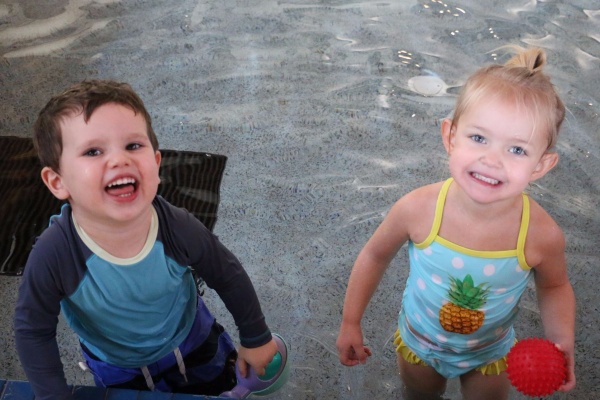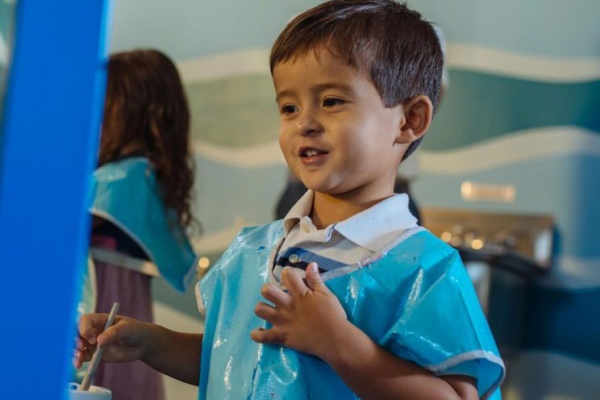

Cold and Flu Season is Upon Us. Here's How You Can Be Prepared
A chill is in the air and what is commonly known as "cold and flu season" is now upon us. The increase in viral respiratory illnesses really has less to do with actual temperature changes and more to do with the fact that people spend more time indoors, in close quarters, where germs can more easily and rapidly spread. Sometimes catching a virus is simply inevitable, but there are certainly steps you can take for yourself and your children to decrease the likelihood of becoming ill.
We spoke with Rachel Orscheln, MD, Assistant Professor of Pediatrics in the division of Infectious Diseases at St. Louis Children's Hospital and Washington University about common seasonal illnesses in kids and how to protect against them, as well as treat them.
"This time of year we see a variety of different respiratory viruses that can have slightly different manifestations," says Dr. Orscheln. "Right now, we're seeing a lot of kids coming in with viral croup. Because we have tests that can see exactly which virus is causing the symptoms, we know that many of these kids are infected with Parainfluenza virus, which is a common cause of viral croup. We're also seeing a lot of kids infected with likely Rhinovirus infection and that often triggers problems like an asthma exacerbation."
With many viruses circulating each year, getting an annual flu vaccine is an easy first line of defense. Flu vaccines are part of the the U.S. vaccination schedule, so in the same way that it is recommended for children to receive their polio or measles vaccines, it is recommended that they receive a yearly flu shot after six months of age. One question that's often on many parents' minds is how the viruses included in each year's unique vaccine are determined.
"There is a group that looks at what influenza viruses are circulating in the Southern part of the hemisphere, and then they try to predict what will be circulating in the U.S. for the following flu season," Dr. Orscheln explains. "So the vaccine is composed of two strains of Influenza A and two strains of Influenza B and there is a hope that will match the circulating strains and provide protection."
While she notes that no vaccine is seen as perfect, she says it's still important to be vaccinated. "We know that influenza can be a serious illness even in otherwise healthy kids, especially those under five years of age. Every year we see somewhere between 50 and 150 pediatric deaths from influenza and 90 percent of those kids are unvaccinated. The influenza vaccine may not protect perfectly against becoming ill, but it certainly reduces the risk that you'll have a complication from influenza."
In addition to kids themselves, it's important for care providers of infants and children, including parents, teachers and regular babysitters, be vaccinated – particularly those who care for children who have chronic diseases and are at a higher risk. Besides vaccinations, basic common sense practices such as good hand hygiene is of course an important defense. Teach kids to wash hands regularly, especially if they have coughed or blown their noses and have had contact with respiratory secretions. Alcohol-based hand sanitizers are also great for fighting germs when soap and water is unavailable, such as in the car or on the go.
"It's also important for people who are ill to stay home from school or work – especially those who are running a fever," says Dr. Orscheln. "We know people can continue to spread respiratory viruses even after they don't have a fever, but their highest burden of spreading infection is when they are acutely ill."
In addition to not spreading the illness, staying home and getting plenty of rest is critical to getting well. For infants and young kids, there aren't really over-the-counter medications that can be safely used to treat symptoms like coughs.
"They really just serve to make the child sleepier, so really very little use and probably some harm," Dr. Orscheln says. "If it's related to a respiratory virus infection, honey is as good as anything else and is safe for children over one year of age for cough or soothing the throat. The most important thing for ill children is to drink plenty of fluids. Eating will often be reduced during a respiratory illness and that's not a big deal as long as they continue to drink fluids."
She also recommends using a saline nasal spray to help clear the secretions if children become very congested. Just be careful to avoid aggressive suctioning as it can actually make the nasal passages more swollen if they are traumatized. With any illness in young infants, especially those under three months of age who have a fever, it's probably best to contact your pediatrician as those infants are most at risk for bacterial infections.
As for the weather – don't buy in to the old myths and wives tales about "catching your death" in the cold. Being cold and/or wet, while uncomfortable, are not typically causes of illness.
"It would take extreme temperatures to really reduce someone's ability to fight off infection," says Dr. Orscheln. "Most illnesses are caused by viruses, so those are not temperature dependent. There are some kids whose asthma or reactive airway diseases may be triggered by seasonal changes or cold air, so there could be a portion of the population who develop symptoms related to weather, but far and away, for most people who become ill it has no relation to weather."
So if your child forgets to put on their coat for recess or refuses to wear it, consider that a lesson rather than a cause for concern unless temperatures are dangerously low.

Amy Burger is a mom, freelance writer and communications professional with nearly 20 years experience working in St. Louis. Her work has appeared in numerous publications and media outlets including STL Parent, Missouri Life magazine, the St. Louis Post-Dispatch, Town & Style and kdhx.org, among others. When she's not working, she enjoys spending time with her husband and two beautiful girls at home in Kirkwood.





















